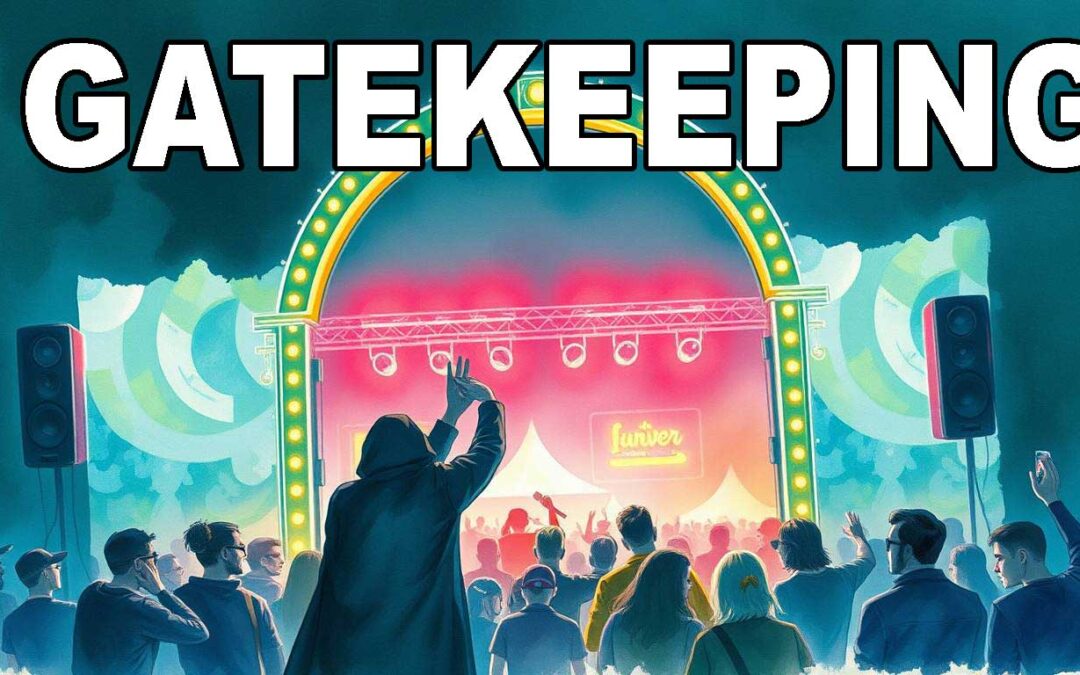In the raw, electrifying corners of the music world — in scenes like psytrance, techno, and drum & bass — lies a contradiction. These genres were born from rebellion, freedom, and experimentation. Yet, paradoxically, they’re now being shaped and stifled by gatekeeping structures that mirror the very institutions they once opposed.
From festivals to labels to club lineups, a quiet but toxic form of corruption has taken root. It doesn’t wear a suit. It doesn’t need to. This kind of corruption wears dreadlocks and designer streetwear. It plays underground while operating like a cartel.
🧱 What is Gatekeeping in Underground Music?
Gatekeeping refers to the control certain individuals or groups exert over access to opportunities in a scene — from bookings to releases, visibility to validation. In theory, scenes should be meritocratic. In practice, they’re often anything but.
In many cases, connections outweigh talent. Algorithms outweigh soul. And favors, politics, and backdoor deals override the true spirit of underground culture.
🧨 How It Happens: The Festival Circuit
Look at the lineups of most major psytrance, techno, or DnB festivals — you’ll notice the same recycled names again and again. Not necessarily because they’re the most talented, but because they’re part of the clique.
Festival booking agents often:
Prioritize friends and inner-circle acts
Ignore fresh local talent
Play it safe to sell tickets, not elevate culture
Reject innovation for brand safety
This isn’t curatorship — it’s monopolization. And it’s killing the culture from the inside out.
🧬 Labels as Power Brokers
Many so-called underground labels have become mini corporations. Instead of nurturing talent, they act as gatekeepers that enforce sonic conformity. If your sound isn’t aligned with their narrow definition of what’s “cool,” you’re ignored or excluded.
What used to be about breaking rules is now about following them to fit in.
🕳️ Clubs & Local Politics
Even at the grassroots level, clubs often recycle the same small group of artists. Promoters book friends, trade favors, or bow to social status — not artistic merit. This keeps scenes closed and repetitive, making it hard for new sounds or unknown visionaries to rise.
This localized nepotism replicates a kind of mini-industry corruption — just without the boardrooms. The vibe might be underground, but the politics are pure establishment.
⚡ The Cost of Gatekeeping
Gatekeeping in underground scenes leads to:
Cultural stagnation
Artist burnout and disillusionment
Disconnection from the original purpose of the genre
Exploitation of community loyalty for commercial gain
Worst of all, it silences the very voices that could push genres forward. The weirdos. The risk-takers. The new kids on the block with something real to say.
🌱 What Can Be Done?
Support Independent Artists: Go to smaller stages. Buy directly from artists. Share unknown tracks.
Call Out Favoritism: Challenge promoters and festivals who only book their friends.
Create New Platforms: Start your own nights, collectives, or micro-labels.
Educate Your Scene: Share articles like this. Talk about it in your networks.
🌀 True Underground is Inclusion, Not Exclusion
Gatekeeping doesn’t protect the underground. It rots it.
True culture thrives on diversity, experimentation, and open doors. If psytrance, techno, and DnB are to survive as more than commercial shells, we need to root out the elitism and bring back the soul.
It’s time to unchain the gates.
Written by the team at Parandroid-Music.com — for the creators, not the gatekeepers. Explore more truth-driven content at Audionerdz.net
- Sale!

VECTRA – The Living Synthesizer (Early Access)
Original price was: 199,00 €.89,00 €Current price is: 89,00 €. - Sale!

Alpha Sirius Hitech Trance Template – 175 Bpm Am
Original price was: 19,99 €.9,99 €Current price is: 9,99 €. -

Audionerdz Hitech Foundry Volume One – Sully FX Uplifter
0,50 € - Sale!

Paranndroid`s Ultimate Acid Critters Sample Pack (1 Hour of Samples)
Original price was: 49,99 €.24,99 €Current price is: 24,99 €.





